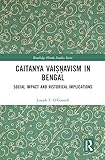Caitanya Vaiṣṇavism in Bengal : social impact and historical implications / Joseph T. O'Connell ; edited by Rembert Lutjeharms.
Material type: TextSeries: Routledge Hindu studies seriesPublisher: Abingdon, Oxon ; New York, NY : Routledge, 2018Description: 1 online resourceContent type:
TextSeries: Routledge Hindu studies seriesPublisher: Abingdon, Oxon ; New York, NY : Routledge, 2018Description: 1 online resourceContent type: - 9780429445392
- 0429445393
- 9780429817960
- 0429817967
- 9780429817977
- 0429817975
- 9780429817953
- 0429817959
- Chaitanya (Sect) -- India -- Bengal
- Vaishnavism -- India -- Bengal
- Hinduism -- India -- Bengal
- Vaishnavism -- Relations -- Islam
- Chaïtanya (Secte) -- Bengale (Bangladesh et Inde)
- Vishnouisme -- Bengale (Bangladesh et Inde)
- Hindouisme -- Bengale (Bangladesh et Inde)
- Vishnouisme -- Relations -- Islam
- RELIGION -- Comparative Religion
- SOCIAL SCIENCE -- Ethnic Studies -- General
- Chaitanya (Sect)
- Hinduism
- Interfaith relations
- Islam
- Vaishnavism
- India -- Bengal
- 294.5/512095414 23
- BL1285.342 .O26 2018eb
- online - EBSCO
| Item type | Current library | Call number | URL | Status | Notes | Barcode | |
|---|---|---|---|---|---|---|---|
 eBook
eBook
|
Biblioteca "Angelicum" Pont. Univ. S.Tommaso d'Aquino Nuvola online | online - EBSCO (Browse shelf(Opens below)) | Online access | Not for loan (Accesso limitato) | Accesso per gli utenti autorizzati / Access for authorized users | (ebsco)1892433 |
"Within the broad Hindu religious tradition, there have been for millennia many subtraditions generically called Vaiṣṇava, who insist that the most appropriate mode of religious faith and experienceis bhakti, or devotion, to the supreme personal deity, Viṣṇu. Caitanya Vaiṣṇavas, a community of Vaiṣṇava devotees who coalesced around Kṛṣṇa Caitanya (1486-1533), who taught devotion to the name and form of Kṛṣṇa, especially in conjunction with his divine consort Rādhā and who also came to be looked upon by many as Kṛṣṇa himself who had graciously chosen to be born in Bengal to exemplify the ideal mode of loving devotion (prema-bhakti). This book focusses on the relationship between the 'transcendent' intentionality of religious faith of human beings and their 'mundane' socio-cultural ways of living, through a detailed study of the social implications of the Caitanya Vaiṣṇava devotional Hindu tradition in pre-colonial and colonial Bengal. Structured in two parts, the first analyses the articulation of Kṛṣṇa-bhakti within the broad Hindu sector of Bengali society. The second section examines Hindu-Muslim relationships in Bengal from the particular vantage point of the Caitanya Vaiṣṇava tradition, and in which the subtle influence of Kṛṣṇa-bhakti, it is argued, may be detected. In both sections, the bulk of attention is given to the sixteenth and seventeenth centuries, when Bengal was under independent Sultanate or emergent Mughal rule and thus free of the impact of British and European colonial influence"-- Provided by publisher
Includes bibliographical references and index.
Caitanya Vaiṣṇava community -- Institutionalizing Prema-bhakti -- Changing social structures -- Integrating socio-cultural diversity -- Demographics : gender, caste, region -- Ambiguous Jati Vaiṣṇavas -- Hybrid Vaiṣṇava Sahajiyas -- Vaiṣṇavas in sultanate and Mughal Bengal -- The meaning of "Hindu" -- Vaiṣṇava perceptions of Muslims -- A Muslim perception of Hindus -- Caitanya Vaiṣṇavas and pan-Hindu awakening.
Print version record.
Joseph T. O'Connell was Professor Emeritus in the Study of Religion in the Department and Centre for the Study of Religion, University of Toronto, Canada. This book represents the culmination of his lifetime of scholarship.


